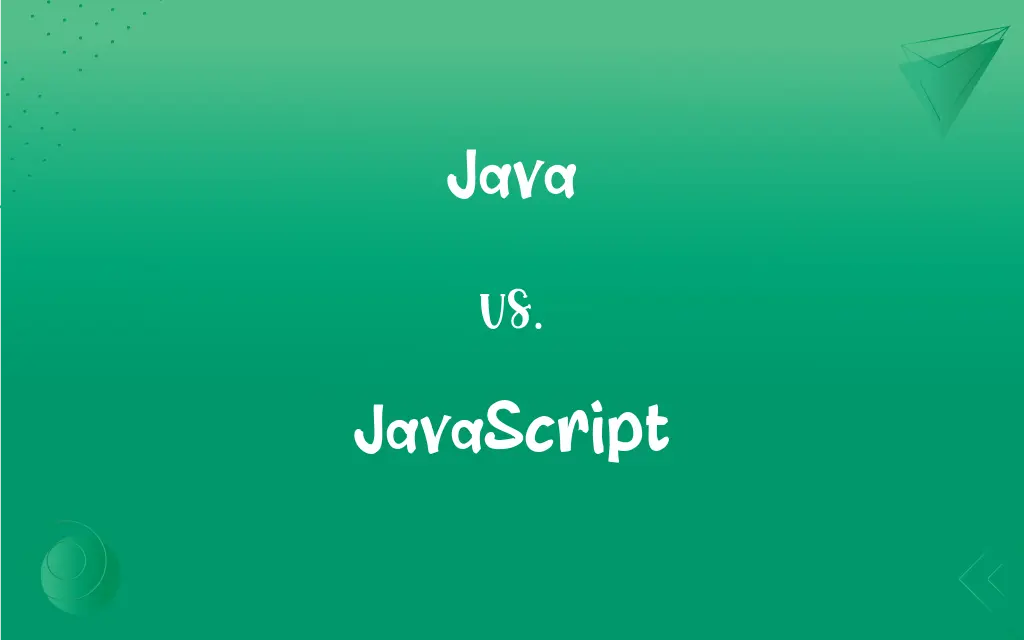Java vs. JavaScript: What's the Difference?
Edited by Janet White || By Harlon Moss || Updated on October 19, 2023
Java is an object-oriented programming language; JavaScript is a scripting language for web browsers.

Key Differences
Java is a widely-used, object-oriented programming language developed by Sun Microsystems, which is now owned by Oracle. JavaScript, despite its name, is not directly related to Java and was developed by Netscape as a lightweight, client-side scripting language for web browsers.
Java applications are typically standalone programs or backend applications running on servers. These applications are written using the Java programming language and require the Java Runtime Environment (JRE) to run. On the other hand, JavaScript is primarily embedded within HTML documents and runs directly in the web browser, interacting with the Document Object Model (DOM) of a web page.
Java is compiled into bytecode, which is then interpreted by the Java Virtual Machine (JVM) on the end-user's machine or server. This makes Java platform-independent as the bytecode can be executed on any machine with a JVM. In contrast, JavaScript is interpreted directly by the web browser in which it's running, without the need for compilation.
Java requires explicit data type declarations for variables, emphasizing strong typing, which can lead to fewer runtime errors related to type mismatch. JavaScript is dynamically typed, meaning the data type of a variable is determined at runtime based on the value it holds, offering more flexibility but also potential pitfalls.
While both Java and JavaScript can be used for web development, they serve different purposes. Java often powers server-side applications, applets, and Android apps, while JavaScript enhances interactivity and dynamics on the client side of web applications.
ADVERTISEMENT
Comparison Chart
Primary Use
General-purpose programming
Web-based scripting
Execution
Compiled to bytecode, runs on JVM
Interpreted by web browsers
Relation to Web
Often for server-side or applets
Primarily for client-side scripting
Typing
Strongly typed (explicit data type declarations)
Dynamically typed
Platform Dependency
Platform-independent (runs on JVM)
Depends on browser support
ADVERTISEMENT
Java and JavaScript Definitions
Java
Java applications run on the Java Virtual Machine (JVM).
To execute the Java program, ensure the JVM is installed.
JavaScript
JavaScript is interpreted by web browsers.
The JavaScript code runs directly in the Chrome browser.
Java
Java is used for both web and standalone applications.
Her enterprise software is built using Java.
JavaScript
JavaScript enhances web interactivity and dynamics.
To improve user experience, he incorporated JavaScript functions.
Java
Java is an object-oriented programming language.
He developed a mobile app using Java.
JavaScript
JavaScript is a scripting language for web browsers.
She added animations to her website using JavaScript.
Java
Java was developed by Sun Microsystems.
Java's history traces back to its creation at Sun Microsystems.
JavaScript
JavaScript interacts with the Document Object Model (DOM).
Using JavaScript, he dynamically modified the web page's DOM.
Java
Java programs are compiled to bytecode.
After writing the Java code, she compiled it to bytecode.
JavaScript
JavaScript was developed by Netscape.
Netscape's contribution to web development includes the invention of JavaScript.
Java
Brewed coffee.
Java
A blend of coffee imported from the island of Java.
FAQs
Where is JavaScript primarily executed?
JavaScript is executed in web browsers.
Is JavaScript a version or subset of Java?
No, JavaScript and Java are distinct and unrelated languages.
What's the primary platform for Java applications?
Java applications often run on servers, desktops, and Android devices.
Can Java run in a browser?
Historically, Java could run in browsers as applets, but this is now largely obsolete.
Can JavaScript run outside of a browser?
Yes, with environments like Node.js, JavaScript can run server-side.
Are Java and JavaScript syntax similar?
They share some similarities due to C-like syntax, but they're fundamentally different.
What does Java stand for?
Java doesn't stand for anything; it's named after Java coffee, suggesting its developers' preference for coffee.
Which language is older, Java or JavaScript?
Java predates JavaScript by a short period.
Is JavaScript faster than Java?
It depends on the use case; JavaScript may be faster for web tasks, while Java is optimized for heavy computations.
Why is Java's write-once-run-anywhere significant?
It means developers can write Java code once and run it on any device with a JVM, ensuring platform independence.
Is JavaScript only for web developers?
While its mainstay is web development, JavaScript is also used in other areas like server-side programming.
Does JavaScript support object-oriented programming?
Yes, JavaScript supports OOP, though its implementation differs from classical OOP languages.
Are there any similarities between Java and JavaScript?
Beyond some syntactic similarities, both can be used in web contexts, but their primary purposes and operations differ.
Can I use JavaScript for backend development?
Yes, using environments like Node.js, JavaScript can power backend applications.
Are Java applets still in use?
Java applets have largely become obsolete due to security concerns and modern web technologies.
What's the main paradigm of Java?
Java is primarily an object-oriented programming language.
Is Java platform-dependent?
No, Java is platform-independent due to its bytecode and JVM system.
Can I build mobile apps with Java?
Yes, Java is the primary language for Android app development.
Which companies developed Java and JavaScript?
Java was developed by Sun Microsystems, and JavaScript by Netscape.
Is Java used in web development?
Yes, Java is used in server-side web development, especially with frameworks like Spring.
About Author
Written by
Harlon MossHarlon is a seasoned quality moderator and accomplished content writer for Difference Wiki. An alumnus of the prestigious University of California, he earned his degree in Computer Science. Leveraging his academic background, Harlon brings a meticulous and informed perspective to his work, ensuring content accuracy and excellence.
Edited by
Janet WhiteJanet White has been an esteemed writer and blogger for Difference Wiki. Holding a Master's degree in Science and Medical Journalism from the prestigious Boston University, she has consistently demonstrated her expertise and passion for her field. When she's not immersed in her work, Janet relishes her time exercising, delving into a good book, and cherishing moments with friends and family.






































































